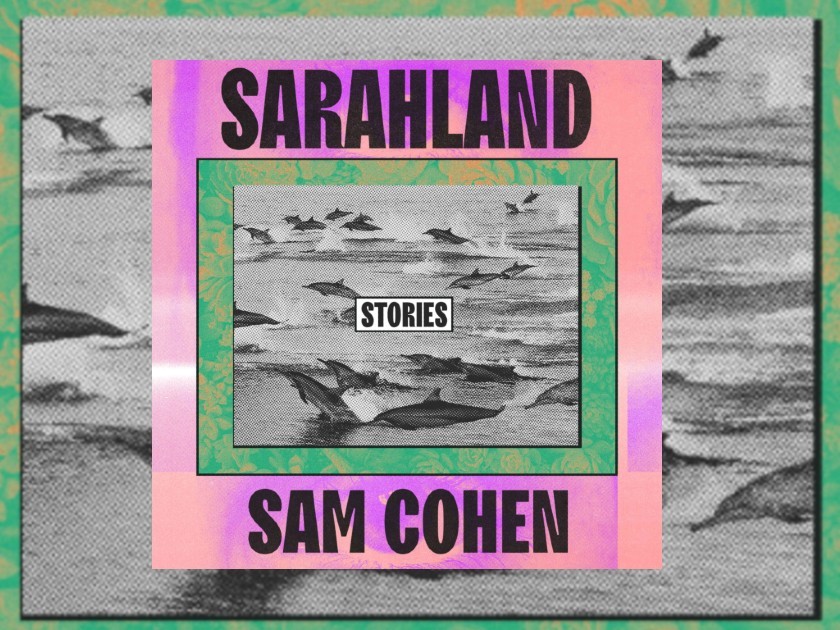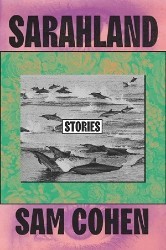
Sam Cohen’s Sarahland is a collection of short stories that look at the lives of many Sarahs across time and locale; playing with narrative against a surreal backdrop, Sam Cohen spoke to JBC about storytelling, the self versus the collective, and queer coming of age stories.
Simona Zaretsky: Sarahland is comprised of ten stories of Sarah’s that span time and place, but there is a connectivity that links each one to the next (and not just the presence of a Sarah character). What drew you to this intricate form of storytelling? What attracted you to the story of Sarah — biblically speaking, and in more contemporary times?
Sam Cohen: I had the idea to do a collection of stories with a single character name because I loved the idea that it’s not possible to fully separate self from non-self. “Sarah” had been kind of my avatar name in writing long before I started this book.
I love that you call the form of storytelling intricate because I think you’re right, but to some degree I chose to write stories because it seemed easier than a novel. But then I thought that stories were such a great way to tell a queer coming of age story — an almost obliteration and then rebirth as something else — made possible because of the story that was left behind, or the new story being discovered.
I knew that I had to include the biblical Sarah because she is the first Sarah, the origin of Sarahs! I had the idea that the biblical Sarah would be a flash piece, a quick retelling of the parable, but it kept raising new questions and growing and ended up becoming so central to the book.
SZ: Many of the characters are in a foggy state of being; they are struggling to create a defined self. In the very first story, “Sarahland,” you look at the idea of the “real Sarah” as the narrator struggles to find a sense of identity or personhood outside of “the horde of Sarahs.” There is at once a multiplicity of the selves apparent in the narrator, and yet she herself feels devoid of uniqueness; the characters then seem to be drawn to the other, or those they sense as following qualities or passions that make them individuals. They are “inertia sucked.” Can you discuss this recurring character trait and theme?
SC: So this question of how or whether to individuate and what “we” join up with are the themes that started the collection, and those themes were really underscored by the continuous-yet-disjointed Sarah that became endemic to the form of the book. When I was younger and in workshops, I learned fiction craft in this way that made it seem as though it was a given that “characters” had these discrete sets of traits, that they “wanted” something and you had to know what that thing was. But I never knew what I wanted as a person and I thought, what if what the character wants is to know what they want? Or, what if they want a way of living that makes sense to them? A kind of cohesion that they lack? I just read an interview with Joe Brainard where he says he’s annoyed that most people don’t take seriously enough that we’re animals and I thought that would have been a good epigraph for this book. The characters want to take being an animal seriously and they’re so far removed from that.
When I got older I started to realize, well, when the collective is so unconcerned with the health of the whole — as ours is — it’s hard to know how to be. Individuation sometimes feels like a capitalist trap, a way to keep you obsessed with your own image, spending your money and energy on self-improvement. For a lot of the characters in Sarahland, a kind of merging or twinning with other characters makes it feel possible to find other ways of being, whether it’s getting serious about being an animal or trying to create a self outside of patriarchal thinking. A lot of girls do this, not just queer or feminist-leaning girls I think — start to dress alike, develop their own language, twin — as they develop little worlds away from the male gaze, little worlds where they are free together.
SZ: There is a pervasive sense of limited agency, for those operating within the patriarchal binary standards of society, personified within the setting of God versus Mother Nature. Can you speak a bit about this male/female binary and how you address it in your stories?
SC: The God character is representative of the patriarchal and hierarchical stories that power our world, the kind of thinking that exists behind so much planetary life — including the idea that the lives of many humans exist as resources for a few special humans. Mother Nature is representative of a form of storytelling about a different kind of power: the connectivity and interdependency between all Earth’s life. And so God’s vanquishing of Mother Nature is really about patriarchal thinking and domination usurping curiosity and concern for the collective.
For a lot of the characters in Sarahland, a kind of merging or twinning with other characters makes it feel possible to find other ways of being.
I see how this feels representative of a male/female binary because it’s true that hierarchical power in our society puts cishet white men at the top, and everyone else is a kind of resource for that group — or reviled for their refusal/inability to be. But in my view, the patriarchal power represented by this “God” benefits no one. Masculinity demands renunciation from feeling, from the possibility of transformation, from full connection — it even demands violence, and treating others as resources. It’s true that there are some men with violent tendencies in the book, but I actually don’t believe they’re acting on organic desire but instead according to this story of masculine power. It’s also true that in a society running on a story of patriarchal power, a similar set of behaviors is demanded of women in order to gain any kind of “equality,” in what Naked Furniture Sarah calls, “The Grand Shitpile.” A society operating by the logic of “Mother Nature” might upend the binary and ultimately be beneficial to everyone, including men and also the trees and the polar bears.
SZ: Throughout the collection, TV shows and movies are important cultural touchstones and important parts of characters’ lives. Can you talk about the significance of these cultural references and why it was important to steep so many of the stories in these real-life cultural experiences and individuals, especially considering the surreal settings of some of them?
SC: I was thinking a lot about José Muñoz’s Disidentifications while writing this book, especially “Exorcism.” Muñoz was interested in how queer and minoritized people find odd ways to identify with figures from pop culture and media and, in this strange identification, transform those figures in order to allow for new possible ways to move and to be. I wanted to try out doing that in fiction.
SZ: The ritual of eating and drinking plays such an important role in how characters interact and in their own sense of self-worth. It seems tightly bound up in femininity and the body, and the spoken and unspoken rules of consumption and material culture — what is the significance of this?
SC: “The First Sarah,” the biblical story, is set in a time when, I’m imagining, there’s a lot more connection to the land, more awareness of how individual plants and animals come to compose the body. I actually think eating is one of the deepest, most romantic merge-relationships there is, but food is so abstracted in our culture.
In the first couple of stories, the characters exist in all-girl contexts (a dorm and a fetish dungeon) in which it’s not really acceptable for girls to eat. I think what underlies it is this messaging that the world is not for you, you need to find a way to subsist, but for others, without finding your own deep pleasure.
SZ: Traditional higher education is the background of several of the stories, and it is a combination of literature and social experiences that seem to be the pivotal forces for the characters. Can you speak about the influence of education — formal and informal — throughout the stories?
SC: I’ve spent a lot of my life in academic institutions and I feel aware that such institutions are often contexts in which people are able to remain sort of hypothetical, sort of in a place of endless possibility. Even traditional education in this book is often not used traditionally, but is kind of a hideout space for characters who are unable join and fully participate in the world. Even when “Sarahland” Sarah is pre-med, she is secretly planning to become a dolphin scientist, or even a dolphin. When “Naked Furniture” Sarah changes her major to English, she’s learning from the books that are passed on to her from other students.
I also like to poke a little fun at people who live within academic institutions — such as in “Gemstones” and “Becoming Trees” — who sometimes ascribe a kind of ethical purity to themselves. But I also love people who remain idealists, who imagine new ways of being, who believe a new world is possible — and these are often the same people.
SZ: In “Naked Furniture” you examine the destructiveness of having only one narrative, “The Only Story,” as Sarah/Dorothy thinks of it.The familiarity of the narrative seems to have limited her as an individual — can you speak about narrative and how the stories, individually and as a whole, disrupt more traditional linear approaches?
SC: Yes, I love this question. Sarahland is very much a book about finding and creating new stories by which to live. That happens within individual stories as characters reimagine pop culture and the Bible, or simply reject what they’ve learned is possible and then are sort of adrift as in “Naked Furniture.” As a whole, I see the book as a queer coming of age story that is punctuated by each Sarah having an almost full-stop ending to her story and way of being, before she is reborn as a new version of herself, in a new context. Being stories, it’s possible for the book to not just have one answer or ending, but a series of options for types of endings.
Being stories, it’s possible for the book to not just have one answer or ending, but a series of options for types of endings.
SZ: Could you talk a bit about your literary influences? (The Bible, perhaps?) Fan fiction is also present throughout the stories, how did this genre affect your own work?
SC: When I write using literary and pop culture references I’m more influenced by New Narrative — Kathy Acker, Dodie Bellamy, and even some younger queer writers like Tom Cho and Myriam Gurba — than directly by fan fiction, which, I will admit, I am not a reader of. Some years ago, my friend’s teenaged daughter came to stay with me for a few days and taught me all about fan fiction, and I saw a connection between fan fiction and new narrative — a similar impulse to insert oneself into the story, to understand the self via fictional representation, to want to dwell— maybe too long — in fictional worlds. When I was writing a character who was very obsessive, who had trouble distinguishing between fantasy and reality, it felt like a natural fit to make her a fan fiction writer. Similarly, I love seeing the Bible as a series of stories open for riffing, translation, and adapting to my own desires.
SZ: In “Gemstones,” Ry ultimately makes decisions based on the emotional logic that “the fear of losing home was so primal.” How do you see the idea of home playing out in these stories and as a driving force?
SC: It’s so incredibly hard to find a home that feels safe and comfortable, and so to willingly give up home is terrifying, even if it means following desire, or growing. Sometimes these things feel at odds — living in safety and comfort with others, versus trying to transform the self and the collective — or finding a new collective in order to transform the self — this is a real tension in the book.
SZ: What is Sarahland to you?
SC: A great question and a hard one to answer because Sarahland is always transforming! It starts out as a kind of stifling collective — this all girls’ unofficially-Jewish college dorm, in which girls keep each other safe by adapting to heteropatriarchal norms. But it really transmutes so that by the end it’s a part-plastic world that has somehow given birth to new life. And so maybe Sarahland is always the collective one finds, or creates, or is stuck in, that then determines who the self — the Sarah — is, or can be.
SZ: What are you currently reading? What are you working on next?
SC: I just read Leonora Carrington’s The Hearing Trumpet and loved it. I am enjoying reading some other just-released books as I go through book launch activities: Detransition, Baby, Luster, 100 Boyfriends, Milk Fed. I am reading Swann’s Way for a book club. What’s next is in early stages and therefore a surprise.
Simona is the Jewish Book Council’s manager of digital content strategy. She graduated from Sarah Lawrence College with a concentration in English and History and studied abroad in India and England. Prior to the JBC she worked at Oxford University Press. Her writing has been featured in Lilith, The Normal School, Digging through the Fat, and other publications. She holds an MFA in fiction from The New School.



